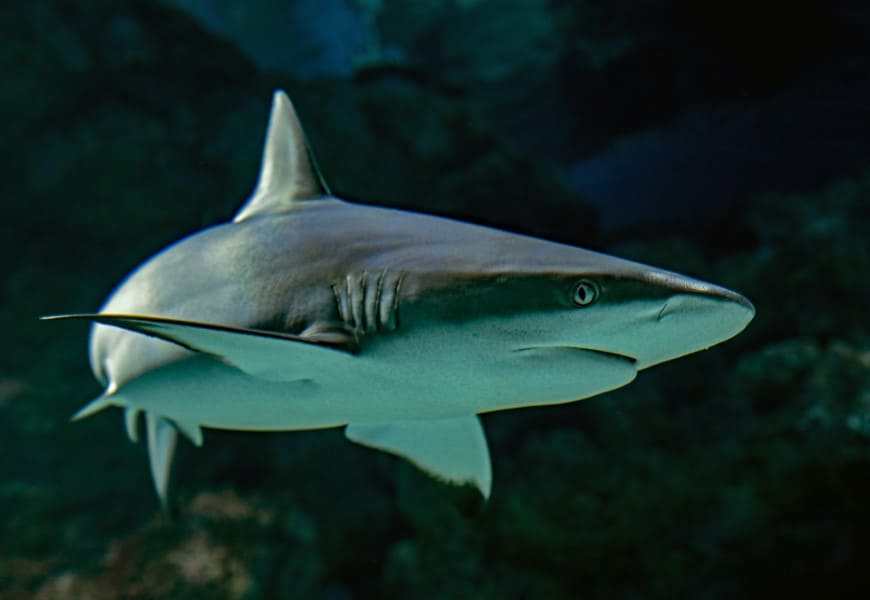You’re probably wondering do sharks sleep? Or where do sharks sleep? And do sharks die if they stop moving?
Well, we’re here to answer all the questions you might be confused about and more, as well as some information you perhaps haven’t thought about.
But first, here’s the quick and simple answer then we’ll get into more details…
Do sharks sleep? Every shark needs to keep water moving over their gills so they can survive, so some do need to keep moving while resting. Some sharks, however, for example, the nurse shark have an external respiratory opening that allows them to stay still. Letting them sleep while stationary.
There are so many other questions such as. Where do they sleep? How do they sleep? When do they sleep? So let’s get on to answering these questions while we’re here!
Where do sharks sleep?
Sharks tend to sleep in deeper parts of the ocean while still moving as opposed to near the top, such as on a coral reef or the sea bed where it’s sandy.
Some sharks will roam around these areas while they’re asleep – or “resting” whereas others use methods to allow oxygen-rich water to pass over their gills, this is explained in more detail in the next question

How do sharks sleep?
The way sharks sleep is much different from any other animal. You’d think they need to keep moving to stay alive, implying they don’t sleep. But many sharks use a method called ‘buccal pumping’ where they suck water in via their mouth and force it out of their gills using their cheek muscles, these are called obligate ram ventilators.
Other sharks have something called spiracles which force water over their gills allowing them to breathe without moving.
And some sharks use both of these methods.
Here’s how squirrels sleep!
When do sharks sleep?
Sharks do not sleep the same as humans do, at least not in a deep sleep as humans do, half of their brain stays active while the other half is in a light ‘sleep’, meaning they’re oscillating between wakeful and restful periods throughout the day.
Also, sharks never enter an unconscious state.
Sharks are nocturnal, which means they sleep during the day and are active during the night. At night sharks will hunt and attack their prey and scavenge for food.
What happens if sharks don’t sleep?
Nothing bad will happen if sharks don’t sleep, the only reason for them not sleeping would be because of migration, spawning, parental care, or if there’s a greater amount of food during the time they would normally be sleeping.
If a shark sleeps and does not get enough oxygenated water, the shark will die.
Here’s the list of animals that don’t sleep, or just look asleep!
Have any sharks been filmed sleeping?
Yes, many sharks have been filmed sleeping. Usually with ‘robot’ cameras or hidden ocean cameras – but professionals have filmed sharks sleeping while swimming/floating while right next to them.
You might also like:
Do Sharks Have Bones? How a Shark’s Skeleton Works
Do Sharks Have Tongues? Yes, but Only Three Sharks Use Them
Learning resources
We’ve found the ideal resources to continue your learning at home and at school on amazon. Help support our efforts for wildlife causes and keep this site working for nature. Amazon also donates to wild-life related charities!
The Ultimate Book of Sharks (National Geographic Kids)
Dive into the wild world of sharks! This book allows you to get up close to learn the truth behind these fantastic, ferocious fish with famed National Geographic photographer and explorer Brian Skerry.
Video Resources
So finally…
To sum everything up on the question do sharks sleep, yes sharks do sleep in a way that they remain conscious. Here’s a list explaining all the breathing apparatus and techniques that keep them alive while they sleep…
- Spiracles – an external respiratory opening which forces oxygen-rich water through their gills
- Buccal Pumping – a method used by sharks in which they suck in water through their mouth and use their cheek muscles to force it through their gills
- Wakeful/Un-wakeful sleep – all sharks oscillate between wakeful and un-wakeful sleep.
This content has been checked and verified by a qualified veterinary practitioner. The article has been reviewed by our editorial board and has been approved for publication in accordance with our editorial policy.
